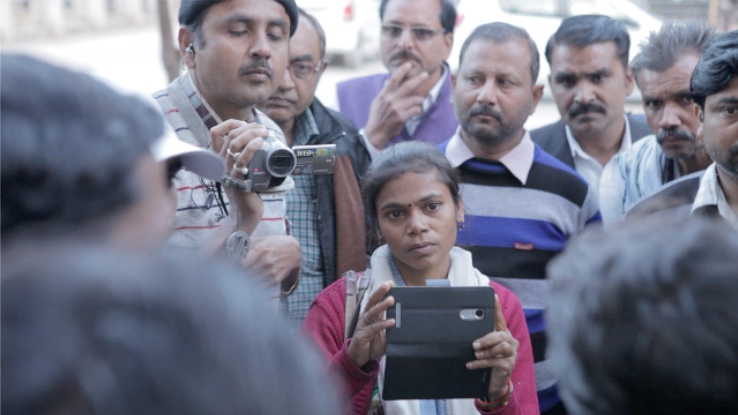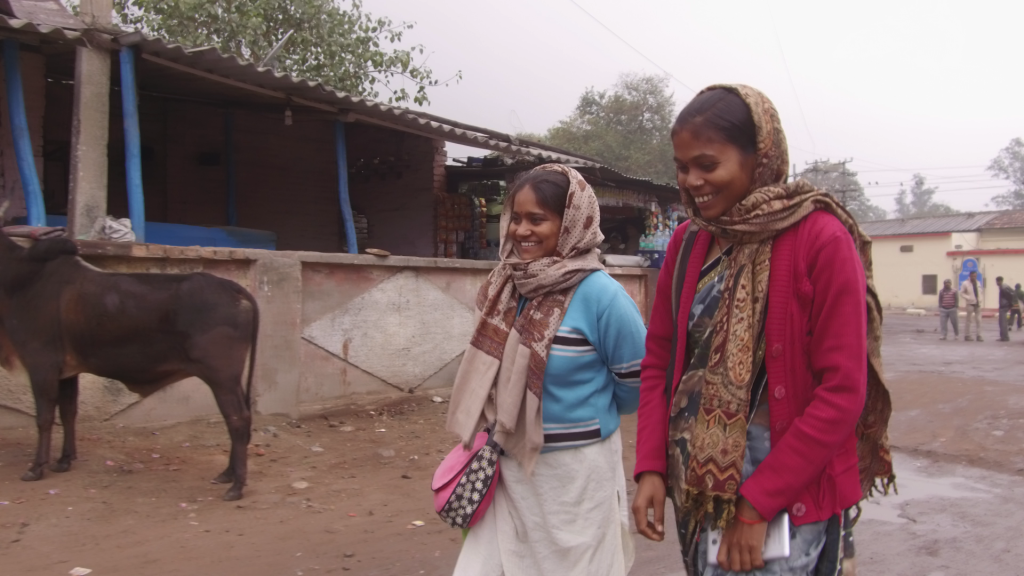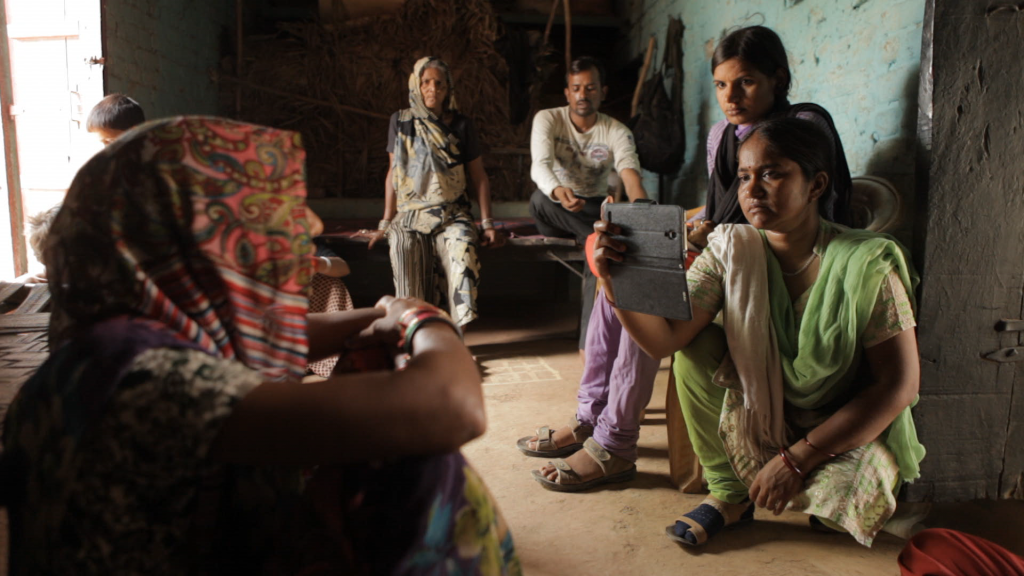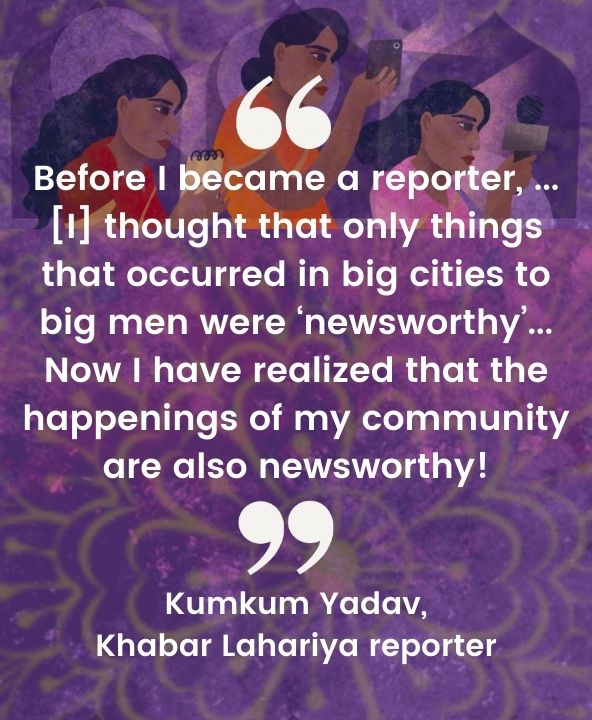During the day, Kumkum Yadav studies law and prepares for the tough national exam to enter government service. Evenings, however, find the 22-year-old farmer’s daughter ignoring comments from nosy neighbors and roadside Romeos as she uses her trusty phone to record the goings-on in her community in Ayodhya, in the northern Indian state of Uttar Pradesh.
Part of a staunchly patriarchal community that frowns on women leaving their homes unescorted by male family members, Yadav has nevertheless devoted much of her time roaming the neighborhood mostly on her own, in search of stories of injustice and lack of development, which, in this corner of Uttar Pradesh, happen to be plenty.
“I’ve reported on everything from neighborhoods in the throes of a water crisis caused by a broken hand pump, to how young people in my district use dating apps,” she says.

A Khabar Lahariya journalist holds her own in a male-dominated field. (Photo by Black Ticket Films)
Her mentor is Meera Devi, who looks like most other married Indian women, with a red bindi on her forehead and her hair pulled back in a bun. But the diminutive mother of two transforms into a confident political analyst on her fortnightly online show on local politics. Devi, in fact, has already trained scores of female journalists in a state that, in 2019, reported the highest number of crimes against women — 59,853 — in India. What she has accomplished so far is also a feat in a country where the number of women in media has been on the decline in the last several years.
Devi and Yadav, however, are just two of about 20 intrepid grassroots journalists embedded within their communities and who work for Khabar Lahariya, India’s only feminist news network. Literally translated as “A Wave of News,” Khabar Lahariya is run by rural women from marginalized communities. The network was founded in 2002, and now has a reach of over 10 million viewers a month, using Facebook, YouTube, Twitter, and other social media to bring hyper-local issues to the attention of both local and national audiences.
Many of the reporters and stringers on the network are not educated, and some are even first-time smartphone users. Yet the stories they report from Uttar Pradesh and Madhya Pradesh in central India have won national recognition like the Chameli Devi Jain Award for Women in Journalism in 2004, as well as international honors, such as the UNESCO King Sejong Literacy Prize in 2009.
Indeed, Khabar Lahariya has been overturning archaic Indian thinking about women for years now. Says Meera Devi, “When I became a journalist 14 years ago, it was unheard of for women to work late hours, interview all sorts of people, question the authorities. Even today, women journalists in mainstream media are expected to cover `softer’ beats like lifestyle and fashion.”
Khabar Lahariya’s journalists, however, report on crime, law, politics, and the economy, in addition to lifestyle and culture. And they always ask tough questions — in a country where women are just supposed to listen, and not ask anything. In a program on a popular Hindu festival in which women fast for their husbands, Yadav wondered aloud why only women bore the burden of fasting. When she asked some of the stern-looking men present why they had not thought about fasting themselves, they were apparently caught off-guard, and could only hem and haw feebly in response.
Danger and daring
Often, though, Khabar Lahariya’s journalists find themselves facing intimidatory tactics while working on their stories. Just recently, five men surrounded one of the network’s reporters, Shiv Devi, and threatened to beat her up if she continued investigating the disappearance of government supplies of free rations for schoolchildren. Meant for school midday meals, the rations, which had already been bought, went missing during the latest lockdown.
“Undeterred, she went ahead to complete (the story),” Meera Devi recounts proudly. “Much of our training involves teaching women to be less afraid.”

Most Khabar Lahariya journalists belong to the historically oppressed lower castes. Meera Devi (in blue) says that, as they give voice to the voiceless, their work has empowered them, too. (Photo by Black Ticket Films)
That, of course, is easier said than done, especially in India. The international media nonprofit Reporters Without Borders (RSF) says that with “four journalists killed in connection with their work in 2020 [and countless others attacked and arrested by State authorities], India is one of the world’s most dangerous countries for journalists trying to do their job properly.” RSF also ranked India 142 out of 180 countries in its World Press Freedom Index 2021.
Making matters more dangerous for Khabar Lahariya’s journalists is this: most of them belong to lower castes or communities at the bottom rung of India’s caste system. Called Dalits, they have historically been oppressed, excluded from educational and health care services, and often live below the poverty line. Last March, the international nonprofit group Freedom House downgraded India’s global freedom status to “partly free,” citing increased attacks on minorities and a “crackdown on expressions of dissent by the media, academics, civil society groups, and protesters.”
Dalit women are also often targets of sexual predators. According to a 2020 report by Equality Now and Dalit rights organization Swabhiman Society, 10 Dalit women or girls are raped every day across India.
That Khabar Lahariya reporters are women who belong to the Dalit community and that all kinds of questions are directed to a largely male establishment can only mean that their lives are a constant juggling act. In truth, the award-winning documentary Writing with Fire on Khabar Lahariya documents how these journalists struggle with balancing a demanding workload with personal life, gender bias, and an acutely stigmatized social identity.
Why they take risks and endure all that trouble is partly explained by Yadav. “Before I became a reporter, like most of my peers, I also thought that only things that occurred in big cities to big men were ‘newsworthy,’” she says. “Now I have realized that the happenings of my community are also newsworthy!”

A Khabar Lahariya journalist interviews a local woman, helping the community express their thoughts on issues that concern them most. (Photo by Black Ticket Films)
“Thanks to the politicization of the Ram Mandir issue in Ayodhya, chief minister Yogi Adityanath visits regularly,” Yadav continues, referring to the controversial Hindu temple project. “To me, however, this isn’t all that’s newsworthy here. The news that matters to me is about neighboring villages that don’t have a single working hand pump. Or that crimes against women are on the rise. Or the lack of public transport that forces me to walk about three miles from my village to the main road every day!”
There is also the satisfaction that they are able to effect change or at least force officials into action. Not too long ago, for example, Meera Devi interviewed a woman who had been gang-raped by four men who broke into her house. When Devi learned that the police had refused to investigate as the rapists were too powerful, she willingly blurred the lines between journalism and activism and went to the local police station. On camera, she had the police commit to taking action on the case; an official complaint was finally filed later.
Activism and journalism do mix
Khabar Lahariya makes sure that its reports give voice to the voiceless — and that their concerns are acted on. Its reporters follow up each story after four weeks. If the situation they have written about remains unchanged, they write a follow-up story and tag concerned officials on social media.
“This makes us activists,” admits Meera Devi. “We use our cameras to force accountability and get results.”
During the 2020 pandemic lockdown, for instance, Khabar Lahariya shot a video about the plight of tribal people who were unable to sell forest produce (resins, firewood, etc.), their economic mainstay. Meera Devi says, “Based on our report, the district administration immediately supplied them with free food rations.”
The network has also been able to give local problems larger contexts. In 2019, Khabar Lahariya reporters responded to the #MeToo movement with their broadcast Me Too in Bundelkhand. Among the anecdotes they captured featured a middle-aged widow, who says on camera that she was “accosted” every day when she went to work in projects under the Mahatma Gandhi National Rural Employment Guarantee Act.

This blend of activism and journalism had developed organically since the time Khabar Lahariya was still being printed in several local dialects. But many also recall that Khabar Lahariya’s precursor had itself broken new ground to encourage village women to report on the local news that really mattered to them.
In 1993, graduates of a government-sponsored women’s literacy program had complained that although they were now able to read, few available books and newspapers had content relevant to them. This prompted some social entrepreneurs in Banda, a district in Uttar Pradesh best known for dacoits (a class of bandits) and crippling droughts, to start Mahila Dakiya (Female Postman), a monthly broadsheet. Women entered a male-dominated arena for the first time, becoming both the paper’s writers as well as its readers. They reported on issues that reflected their concerns, in a language they all understood.
Mahila Dakiya not only broke caste and gender barriers. It also generated much-needed pride in the local language. When it folded up in 2000, after the nonprofit supporting it pulled up stakes, a Dalit who had been among its writers refused to let her training go to waste.
Kavita Devi, who had been married at the age of 12, had joined Mahila Dakiya after completing a literacy program in her village. Two years after the newspaper closed, she and seven other individuals founded Khabar Lahariya, with the support of Nirantar, a Delhi-based women’s rights organization.
Today, as the flagship of Chambal Media, a digital media social enterprise, Khabar Lahariya is expanding from Uttar Pradesh and Madhya Pradesh to Chhattisgarh in central India and Bihar in the east. In 2020, Chambal Media started an academy in Chitrakoot, Uttar Pradesh to train female reporters specifically from these two states.
“We’ve devised month-long online modules on digital storytelling, online safety, mobile journalism, and more,” says Chambal Academy head Priya Thuvaserry. The curious thing is that the academy personnel are learning more than they are teaching, she says.
“The world looks so different when viewed through a rural feminist lens,” Thuvaserry says. “It also looks different when the things we take for granted in cities — mobile phones, good Internet connectivity, cheap data plans — are simply not there. Why should we, who have studied in English in metros, be the sole deciders of what news ought to be?”
When the Sundance Institute presented the Audience Award (world cinema documentary) to Writing with Fire in February 2021, it noted that Khabar Lahariya was redefining what it meant to be powerful.
Meera Devi agrees, saying, “When rural women report on hyper-local news in our own dialects, our work becomes so empowering. It enables us to define what news is, and what ought to be — something that so far had been done only by men.” ●
Geetanjali Krishna is the co-founder of The India Story Agency, which specializes in telling environmental, public health, and social affairs stories from South Asia to the world. One of the 16 awardees of the Global Health Security Grant 2021 by the European Journalism Centre, she is a contributing editor at Business Standard, an Indian daily. Her recent by-lines can be found in Times, The British Medical Journal, BBC Future, The Third Pole, and Business Standard.



















